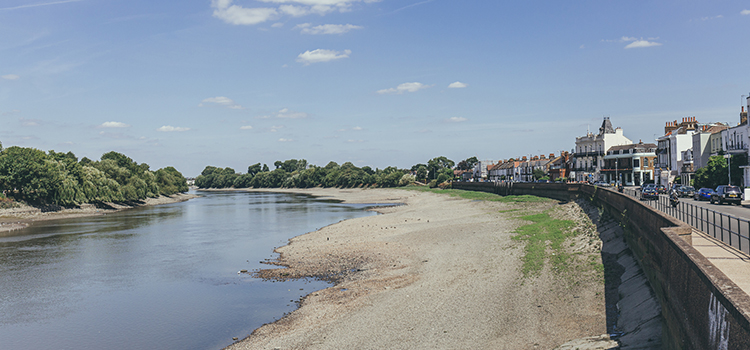Why we could be heading for a drought and what we can do about it
By: News Archive

England and Wales have seen the driest start of the year since 1976 and it has raised concerns that the UK could be heading for a drought.
Now, the government, water companies and individuals all have a part to play in reducing water consumption in the short and long term - according to water expert Prof Kevin Hiscock from the University of East Anglia.
Prof Hiscock, an expert in hydrology and water resources from UEA’s School of Environmental Sciences, said: “The western part of the British Isles is the wettest part, but the population and water supply demand are lower here than in the drier, eastern and south-eastern parts of the country with the densest population and highest water demand.
“Balancing the available water resources against the water demand is met by cross-regional transfers of water as well as through regional, conjunctive use of surface water and groundwater resources. In very dry years, these engineering approaches are tested, especially if we experience consecutive dry winter rainfall periods when recharge to our reservoirs and groundwater is much less than normal.
“Water companies plan for future water demand and aim to create so-called headroom in regional water resources to cope with future demand from house building but also to account for climate change and the need to protect water-dependent environments.
“Continued investment in reducing mains water leakage and longer-term planning to increase reservoir capacity are ongoing. Water companies also have a role in changing consumer behaviour to control water demand, for example through campaigns to install water meters in unmetered areas.
“Changes in land use as part of a nature-based solutions approach, can help with both controlling flooding and enhancing water resources.
“Planting woodland, restoring wetlands and changing cultivation practices such as planting winter cover crops and reduced tillage methods can all enhance water retention in the landscape and so reduce flood runoff and enhance infiltration to aquifers.
“In the longer term, with climate change and summers expected to become warmer for longer, then we will need to manage irrigation water demand to meet the conflicting demands of water supply, agriculture and the environment that arise in drought years.
“We can all make a difference by using water wisely during a drought, for example restricting our use of hosepipes for watering the garden or washing the car.
“In the longer term, then harvesting rainwater for outdoor use, installing water-efficient domestic appliances and, if not already installed, getting a water meter, all help to manage our individual water demand.”
Related Articles

Michael Grange appointed as new Royal Society Entrepreneur in Residence
Michael Grange has been appointed as the new Royal Society Entrepreneur in Residence for the Faculty of Science, following in the footsteps of Dr Soraya Jones who previously held the role.
Read more
Ultra low frequency gravitational waves detected in space
Researchers at the University of East Anglia are part of an international team that have found evidence for ultra-low-frequency gravitational waves in space.
Read more
Study of Earth's stratosphere reduces uncertainty in future climate change
New research led by the University of East Anglia (UEA) reduces uncertainty in future climate change linked to the stratosphere, with important implications for life on Earth.
Read more